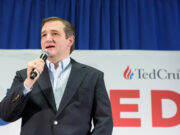I spent a little more than three months at CCP defending your right to free and unhindered speech, and I would gladly do it again.
At a recent Senate Rules and Administration Committee hearing on campaign finance, Senator Tom Udall (D-NM) stated, “Free and fair elections are a founding principle of our democracy…It’s now crystal clear that we need a constitutional amendment to restore integrity in our election system.” Udall, sponsor of a constitutional amendment (S.J. Res. 19) that would not only further strip the freedom of individuals to donate freely to political campaigns and threaten the ability of individuals to donate to advocacy groups, but would also protect any campaign finance legislation put forth by Congress or the states from constitutional challenge, is correct: free and fair elections are a longstanding tradition in American politics.
A constitutional amendment handing sole regulation of the system to those already in power is not the way to guarantee “free and fair.”
Campaign finance may not be the sexiest or flashiest of political topics, but it is one that has arguably the most direct repercussions to our republic because it affects a fundamental part of our government: electing those individuals who run it. At its core, campaign finance restrictions impinge on the First rights enshrined in the Bill of Rights: freedom of speech and association. Regulations limiting the ability of individuals or organizations to contribute however much money to whichever candidate or whatever cause they desire is a limitation on speech and association.
Hypothetically, if Congress told newspapers that they could only publish stories capped at a 350-word limit and that they could only print up to five stories in each issue, citizens would be appalled at this blatant speech limitation and cry out at the injustice. In just one example, Congress told citizens they could only give a certain amount of money to a certain number of candidates, and citizens were forced to remain silent if they hit that limit. Fortunately, the Supreme Court just struck down this limitation in its McCutcheon decision.
Proponents of campaign finance regulations often claim they are aimed at preventing the rich from using their means to influence elections and politicians with their affluence. It’s not, however, the rich who are most affected by these complex campaign finance regulations. Rather, it is the individual hoping to send a small contribution to a cause he believes in, but fears having his name revealed because of our burdensome disclosure laws, which make his or her personal and employment information public. Or the small group of concerned citizens banding together to fight for a cause they deem important that are affected by the years-long waiting periods for 501(c) status approval from the IRS.
Frankly, I knew very little about the colorful history of campaign finance in our nation, but my passion for freedom drew me to the issue. I quickly understood the importance of CCP’s mission and why this small group of First Amendment promoters and defenders come to work every day. It is work that is vital to the continuation and defense of truly “free and fair elections” in this country, and it is a fight for which I am proud to have contributed.














